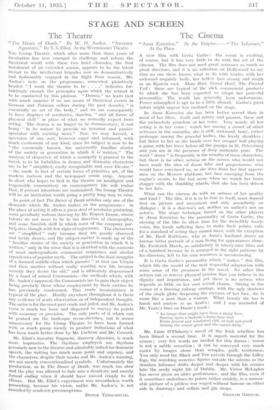STAGE AND SCREEN The. Theatre
"The Dance of Death." By W. H. Auden. " Sweeney Agonistes." By T. S. Eliot. At the Westminster Theatre THE Group Theatre, which after more than three years of incubation has now emerged to challenge and reform the theatrical world with these two brief charades, the first instalment of an extended season, appears to be the latest recruit to the intellectual brigades now so demonstratively and fashionably engaged in the flight from reason. Mr. Auden's note on the programme, somewhat plaintively headed " I want the theatre to be . . . ," indicates for- biddingly enough the principles upon which the retreat is to be conducted by this platoon. " Drama," we learn (not with much surprise if we are aware of theatrical events in German and Parisian cellars during the past decade), " is essentially an art of the body," and we are consequently to have displays of aerobatics, dancing, " and all forms of physical skill " in place of what we normally expect from acting. The drama is no longer to be documentary, it not being " in its nature to provide an ignorant and passive spectator. with exciting news." Nor, we may hazard, a spectator of any sort, however eager and informed, with Much excitement of any kind, since its subject is now to be -4` the commonly known, the universally familiar stories of the society or generation in which it is written." The analysis of character, of which a monopoly is granted to the novel, is to be forbidden in drama and dramatic characters are to be "simplified, easily recognisable and over life-size " —the mode in fact of certain forms of primitive art, of the modern cartoon and the newspaper comic strip. Anyone in short who hopes to fir.d in the theatre an intelligent and responsible commentary on contemporary life will realise that, if present intentions are maintained, the Group Theatre will be an institution worth going a pretty long way to miss.
In point of fact The Dance of Death satisfies only one of the demands which Mr. Auden makes on the programme : in the place of acting it offers a great deal of acrobatic posturing, some peculiarly tedious dancing by Mr. Rupert Doone, whose talents do not seem to lie in the direction of choregraphy, and some Swedish drill in which most of the company par- ticipates, though with few signs of enjoyment. The characters are " simplified " only because they are poorly observed and feebly drawn, and the subject-matter is made up of the " familiar stories of the society or generation in which it is written," only in the sense that it is identical with the contents of most undergraduate communist magazines and similar repositories of popular myth. The subject is the final struggles of a doomed middle-class which pursues " at first one Utopia and then another without really wanting new life because secretly they desire the old," and is ultimately dispossessed by a band of armed Communists—the _methods which, with Air. Auden's approval, the Communists use to gain their object being precisely those whose employment by their victims he has previously condemned. This crude inconsistency is typical of the play. Hardly anywhere throughout it is there any evidence of acute observation or of independent thought. The satire is for the most part crude and jaded, and Mr. Auden's verse is much too loose and dispersed to convey its points with economy or precision. The only parts of it which can, be praised are the burlesque revue-sketches, but it seems unnecessary for the Group Theatre to have been formed With so much pomp merely to produce imitations of what has been much better done by Mr. Cochran and Mr. Coward.
Mr. Eliot's macabre fragment, Sweeney Agonistes, is much More impressive. The rhythms employed are rhythms genuinely-new to the theatre and admirably suited for dramatic 8peeeh, the writing has Much more point and urgency, and the characters, despite their masks and Mr. Auden's warning, are not merely conventionalised symbols. Unfortunately the production, as in The Dance of Death, was much too -slow and the play was allowed to fade into a desultdry and merely ormal ending when it should have moved crisply to its climax. But Mr. Eliot's experiment was nevertheless worth presenting, because his vision, unlike Mr. Auden's, is not annulled by academic preconceptions. bEngx VEnscuoyin.






























































 Previous page
Previous page